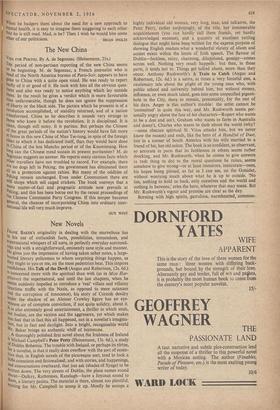The New China
VISA FOR PEKING. By A. de Segonzac. (Heinemann, 21s.)
THE period of non-partisan reporting of the new China seems to be beginning. M. de Segonzac, a French journalist who is head of the North America bureau of Paris-Soir, appears to have gone to China with a quite open mind. He was ready to report badly of it or good of it. He took with him all the obvious ques- tions and also was ready to notice anythihg which lay outside theni. In the result he gives a verdict which is more favourable than unfavourable, though he does not ignore the suppression of liberty or the black side. The picture which he presents is of a revolution accomplished, of stability returned, and of a nation transformed. China as he describes it sounds very strange to those who knew it before the revolution. It is disciplined. It is clean, though still noisy. It is puritan. But perhaps the Chinese or
the great periods of the nation's history would have felt more
at home in this new China of Mao Tse-tung, in spite of the foreign ideas to which it has dedicated itself, than they would have done to China of the late Manchu period or of the Kuomintang. How long can the Chinese mind sustain its present puritanism? M. de Segonzac suggests no answer. He reports many curious facts which other travellers have not troubled to record. For example, there are no dogs left in Peking; the government has eliminated them all as a protection against rabies. But many of the oddities of Peking remain unchanged. Even under Communism there are Rill shops which sell caged crickets. The book conveys that a more matter-of-fact and pragmatic attitude now prevails at Peking; and this has been borne out by the recent proceedings of the Chinese Communist Party Congress. If this temper becomes general, the chances of incorporating China into ordinary inter- hational life will very much improve.
GU? WINT


































 Previous page
Previous page